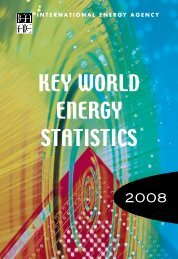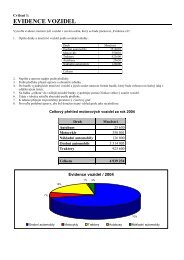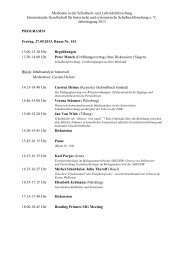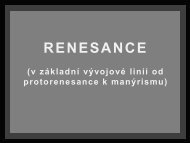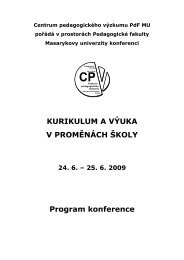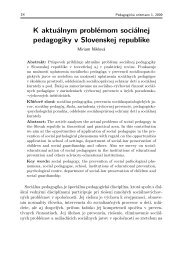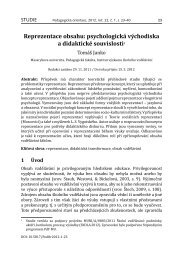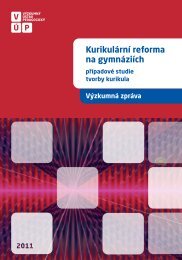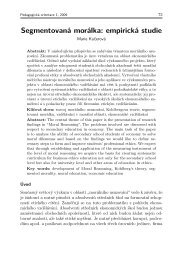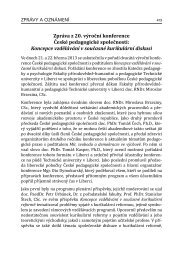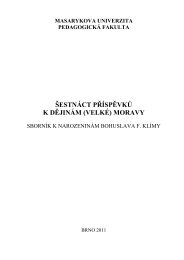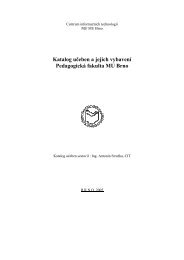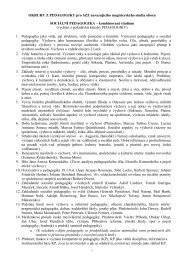SbornÃk pracà Pedagogické fakulty Masarykovy univerzity, Åada ...
SbornÃk pracà Pedagogické fakulty Masarykovy univerzity, Åada ...
SbornÃk pracà Pedagogické fakulty Masarykovy univerzity, Åada ...
You also want an ePaper? Increase the reach of your titles
YUMPU automatically turns print PDFs into web optimized ePapers that Google loves.
TOMASZ MALISZEWSKI<br />
makers of various levels, central and local administration and God know who, and of course, the<br />
society as a whole, the society that does not get enough or proper information from the media<br />
that do not like folk high schools…<br />
Proposal of research project<br />
I would like to propose another way of thinking, a way of thinking that has been accepted<br />
and is close to the community of Pomeranian folk high schools, in particular the people with<br />
some connection to Kashubian High Folk School (Kaszubski Uniwersytet Ludowy), with which<br />
I have had deeply rooted connections and in which I have the significant for me function of the<br />
secretary of the Programme Council, which enables me to implement many concepts of my own<br />
in the practice and reality of a folk high school.<br />
Both the theoretical and practical contexts of the potential role of folk high schools in the<br />
indicated areas has been in the centre of attention of the project, in operation since October 2001,<br />
“Folk High School – School for Life”, implemented by partners from Poland, Denmark,<br />
Germany and Sweden as a part of European Union programme “Socrates–Grundtvig” 14 .<br />
Folk High School in Wieżyca is the initiator and main co-ordinator of the project. The school<br />
was established in 1982. Its educational programme is based both on Grundtvig’s ideas and<br />
Polish traditions. 15 For the two decades of its work for the benefit of Polish Pomerania,<br />
Kashubian Folk School has always tried to face the educational challenges that appeared in the<br />
communities of the region. The urgent needs of the people of the region were also an inspiration<br />
for the “School for Life” project 16 .<br />
The mission of the project was very clearly and adequately expressed: “Polish rural<br />
communities are in a very difficult situation now. The people feel marginalized, they feel that<br />
14 The concept and planning work started in autumn 1999. The first public presentation of the project assumptions took<br />
place during the Polish-Danish adult education seminar in spring 2000 (See also the report: Uniwersytety ludowe w<br />
Polsce i w Danii: O nowy model edukacji dla dorosłych – seminarium w Starbieninie, 1–2 kwietnia 2000 r. [Folk High<br />
Schools in Poland and Denmark: “For a New Model of Education for Adults” – seminar in Starbienino, April 1–2<br />
2000]. In: Edukacja Dorosłych 2000, nr 3/28/, pp. 111–114). The following year was devoted to making the concept<br />
more detailed, to looking for partners in Denmark, Germany, Poland and Sweden, and to preparing a formal application<br />
for EU grant. In autumn 2001, after evaluation procedure and receiving a positive opinion of experts, the project was<br />
approved for implementation (EU grant No: Brussels – Socrates: 90632-CP-1-2001-1-PL-GRUNDTVIG-G1).<br />
15 In 1980’s, training employees and volunteer animators of cultural centres from the rural areas of northern Poland was<br />
the main task of Kashubian Folk High School, which still implements the projects inspiring cultural and educational<br />
activities of the communities of Kashubian and Pomeranian region. In 1990’s, the programme offer was modified and<br />
adapted to the conditions of building social partnership and local democracy. Apart from regional programmes and<br />
training on local self-governance, the environmental protection trend also appeared in the sphere of interest of<br />
Kashubian Folk High School. More about the School, see: MALISZEWSKI, T.: Kashubian Folk High School<br />
– Old/New Learning Opportunities for Adults in Poland. In: Baltic Sea Dialogue, No. 2/1999–1/2000, Göteborg 2000,<br />
pp. 12–13; Idem: Historia i kierunki działalności edukacyjnej Kaszubskiego Uniwersytetu Ludowego [History and<br />
Educational Activity Directions of Kashubian Folk High School. „Rocznik Andragogiczny 1999, Warszawa–Toruń<br />
2000, pp. 182–187; BYCZKOWSKA, S.–BYCZKOWSKI, M.–MALISZEWSKI, T.: Kaszubski Uniwersytet Ludowy<br />
u progu XXI wieku – stan obecny i perspektywy rozwoju [Kashubian Folk High School at the Beginning of 21 st<br />
Century – Current Situation and Development Perspectives]. Gdańsk 2001, p. 20.<br />
16 Whose partners are the different educational institutions and organisations: Folk High School Bornholm (Denmark),<br />
German Adult Education Association (Germany), Pomeranian Association of Rural Communes (Poland), Kartuzy<br />
Starosty in Kartuzy (Poland), Civic Television (Poland), University of Gdańsk – Institute of Education (Poland),<br />
Nicholas Copernicus University – Institute of Education (Poland), Folk High School Mora (Sweden), Folk High<br />
School Tollare (Sweden), Association for Civic Education in Europe (Sweden).The formal agreements on cooperation<br />
within the project between Kashubian Folk High School and other project partners were signed in January<br />
– September 2002.<br />
158



